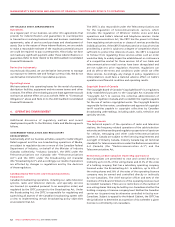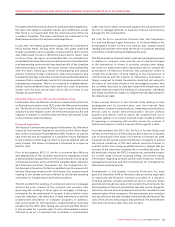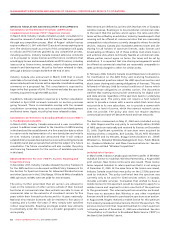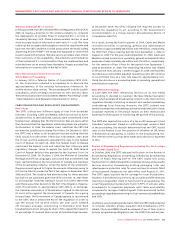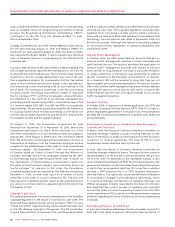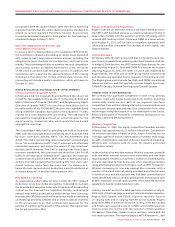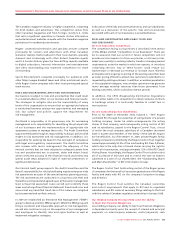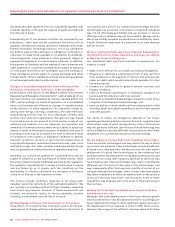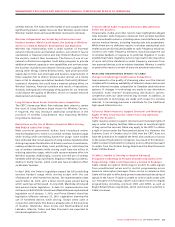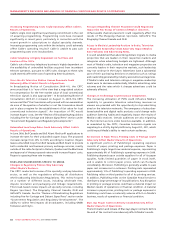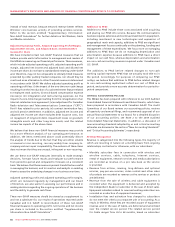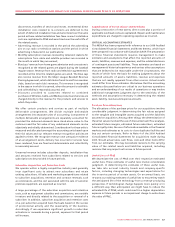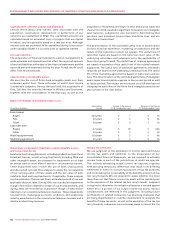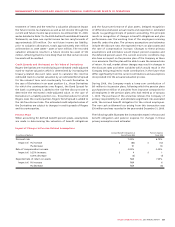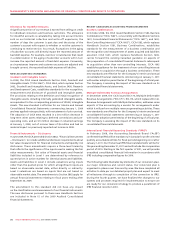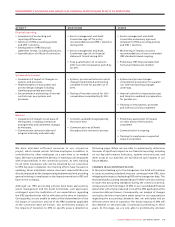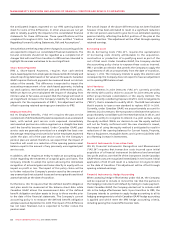Rogers 2009 Annual Report Download - page 58
Download and view the complete annual report
Please find page 58 of the 2009 Rogers annual report below. You can navigate through the pages in the report by either clicking on the pages listed below, or by using the keyword search tool below to find specific information within the annual report.
62 ROGERS COMMUNICATIONS INC. 2009 ANNUAL REPORT
MANAGEMENT’S DISCUSSION AND ANALYSIS OF FINANCIAL CONDITION AND RESULTS OF OPERATIONS
In August 2004, a proceeding under the Class Actions Act
(Saskatchewan) was commenced against providers of wireless
communications in Canada relating to the system access fee charged
by wireless carriers to some of their customers. In September 2007,
the Saskatchewan Court granted the plaintiffs’ application to
have the proceeding certified as a national, “opt-in” class action.
As a national, “opt-in” class action, affected customers outside
Saskatchewan would have to take specific steps to participate in
the proceeding. We applied for leave to appeal the certification
decision to the Saskatchewan Court of Appeal. That application
was later adjourned pending the hearing of certain motions. In
December 2007, we brought a motion to stay the proceeding based
on the arbitration clause in our wireless service agreements. Our
motion was granted in February 2008, and the Saskatchewan Court
directed that its order in respect of the certification of the action
would exclude from the class of plaintiffs those customers who
are bound by an arbitration clause. In April 2008, the Class Actions
Act (Saskatchewan) was amended to authorize the certification
of national, “opt-out” class actions. In an “opt-out” class action,
affected customers outside of Saskatchewan would automatically
be part of the proceeding in that province. As a consequence of the
amendment, counsel for the plaintiffs brought a motion to amend
the certification order previously granted by the Saskatchewan
Court so as to certify a national, opt-out class action. In May 2009,
the Court refused to grant the requested relief and dismissed
the plaintiffs’ motion. In August 2009, counsel for the plaintiffs
commenced a second proceeding under the Class Actions Act
(Saskatchewan) asserting the same claims against wireless carriers
with respect to the system access fee. In December 2009, the Court
ordered that the second proceeding be conditionally stayed on
the basis that it is an abuse of process. Our application for leave
to appeal the 2007 certification decision in the original proceeding
is currently scheduled to be heard in February 2010. We have not
recorded a liability for this contingency since the likelihood and
amount of any potential loss cannot be reasonably estimated. If
the ultimate resolution of this action differs from our assessment
and assumptions, a material adjustment to our financial position
and results of operations could result.
In April 2004, a proceeding was brought against Fido and other
Canadian wireless carriers claiming damages totalling $160 million,
breach of contract, breach of confidence, breach of fiduciary duty
and, as an alternative to the damages claims, an order for specific
performance of a conditional agreement relating to the use of
38 MHz of MCS Spectrum. In May 2009, the Company settled this
litigation for $4 million, which is included in operating, general and
administrative expenses for the year ended December 31, 2009.
We believe that we have adequately provided for income
taxes based on all of the information that is currently available.
The calculation of income taxes in many cases, however, requires
significant judgment in interpreting tax rules and regulations.
Our tax filings are subject to audits, which could materially change
the amount of current and future income tax assets and liabilities,
and could, in certain circumstances, result in assessment of interest
and penalties.
There exist certain other claims and potential claims against us,
none of which is expected to have a materially adverse effect on
our consolidated financial position.
Tariff Increases Could Adversely Affect Results of Operations.
Copyright liability pressures continue to affect our services. If fees
were to increase, such increases could adversely affect our results
of operations.
RISKS AND UNCERTAINTIES SPECIFIC TO WIRELESS
Spectrum Fees May Increase With the Renewal of Cellular &
PCS Spectrum Licences
In March 2009, Industry Canada announced that it would
undertake a formal study to assess the current market value of
certain spectrum licences with a separate consultation seeking
comments on a proposed fee. This consultation is expected to
begin in the first quarter of 2010. This review excludes the spectrum
acquired in 2008 in the AWS auction. The proceeding to examine
spectrum fees could significantly increase Rogers’ payments and
as a result, could materially reduce our operating profit. Any
such increases would begin to apply in 2011 and may impact our
current accounting policies under which the spectrum licenses are
treated as an indefinite life intangible asset and are not amortized.
See also “Consultation on the Renewal of Cellular and Personal
Communications Services (“PCS”) Spectrum Licences” under
Wireless Regulation and Regulatory Developments above.
There is no Guarantee that Wireless’ Service Revenue Will
Exceed Increased Handset Subsidies.
Wireless’ business model, as is generally the case for other North
American wireless carriers, is substantially based on subsidizing the
cost of the handset to the customer to reduce the barrier to entry,
while in return requiring a term commitment from the customer.
For certain handsets and smartphone devices, Wireless will commit
with the supplier to a minimum subsidy. Wireless’ business could
be materially adversely affected if by virtue of law or regulation
or negative customer behaviour, Wireless was unable to require
term commitments or early cancellation fees from its customers or
did not receive the service revenues that it anticipated from the
customer commitment.
The National Wireless Tower Policy Could Increase Wireless’
Costs or Delay the Expansion of Wireless’ Networks.
On June 28, 2007, Industry Canada released a new Tower Policy
(CPC-2-0-03) outlining a new antenna siting policy that took effect
on January 1, 2008. The new policy affects all parties that plan to
install or modify an antenna system, including PCS, cellular and
broadcasting service providers. Among other things, the policy
requires that antenna proponents must consider the use of existing
antenna structures before proposing new structures and owners
of existing systems must respond to sharing requests. Antenna
proponents must also undertake public notification using defined
processes and must address local requirements and concerns.
Certain types of antenna installations are excluded from the
requirement to consult with local authorities and the public.
Foreign Ownership Changes Could Increase Competition.
Wireless could face increased competition if there is a removal of
the limits on foreign ownership and control of wireless licences or a
relaxation of the limits such as seen with the approval of Globalive
to operate with its current ownership structure. Legislative action to
remove or relax these limits can result in foreign telecommunication
companies entering the Canadian wireless communications market,
through the acquisition of either wireless licences or of a holder of


